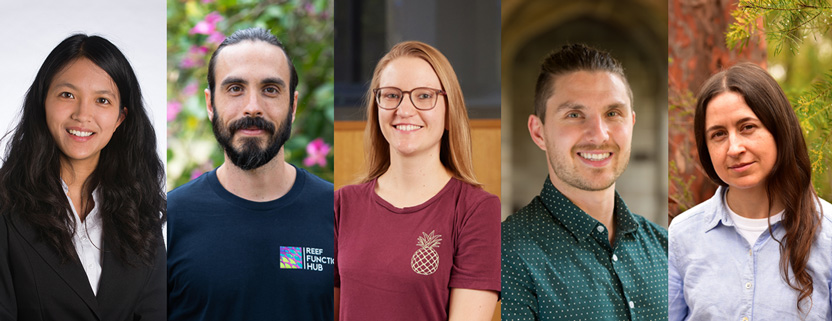Five emerging scientists receive 2025 J G Russell Award
- 3 mins read


(from left) Dr Morgan Li, Dr Alexandre Siqueira, Dr Sarah Piper, Dr Marcus Giansiracusa and Dr Laura Williams. Images supplied.
Five researchers have been awarded funding from the Australian Academy of Science to support research in fields as varied as rare-earth minerals and microplastics.
The Academy’s J G Russell Award provides financial assistance to talented younger researchers in the basic sciences. It recognises the costs involved in experimental research and can be used towards equipment, maintenance and travel.
The award is supported by the generosity of the late Miss J Russell and provides top-up grants of up to $7,000 to projects funded through the Australian Research Council’s Discovery Early Career Research Award (DECRA).
Dr Marcus Giansiracusa, University of Melbourne
Dr Marcus Giansiracusa’s molecular advances aim to enhance efficiency by reducing material quantities and lowering energy costs. Receiving the award will enable him to explore new applications for rare-earth minerals from a chemical design perspective.
“These elements, for which Australia holds a significant global supply, already play a pivotal role in modern technology,” Dr Giansiracusa said.
“I am honoured to receive the JG Russell Award, which will support me in establishing a collaboration with the National High Magnetic Field Laboratory in the USA. I will gain expertise in techniques for quantifying spin coherence in candidate molecules for quantum computing applications,” he said.
Dr Morgan Li, University of Sydney
Dr Morgan Li seeks to enhance the understanding of microplastic transport in natural environments and raise public awareness about this pollution issue through scientific publications and engagement with the Australian microplastic assessment project (AUSMAP) platform.
“I am very excited to have the opportunity to contribute to community outreach in addition to scientific research. This will allow me to engage in scientific communication and share the fun of STEM with a broader audience,” Dr Li said.
Dr Sarah Piper, Monash University
Receptors are crucial proteins that transmit external information across the cell membrane to the cell interior. Using innovative structural biology approaches, Dr Sarah Piper’s project will investigate the molecular details on how the PAC1 receptor, an important G protein-coupled receptor, is activated and how different variants of this receptor change its shape and function.
“I will also utilise the latest 3D graphics tools to communicate the data through molecular movies and 3D animations,” Dr Piper said.
“The award will allow an extended visit with an expert computational lab to apply molecular dynamics simulations to better understand the function of these critical receptors.”
Dr Alexandre Siqueira, Edith Cowan University
Marine biologist Dr Alexandre Siqueira investigates the forces shaping coral reef biodiversity through history. His research aims to uncover the key features of ancient reefs that drove reef fish productivity, a vital ecosystem service for human nutrition.
With the J G Russell Award, Dr Siqueira will collaborate with experts at the Smithsonian Tropical Research Institute, advancing modelling techniques and building networks to bring transformative insights about coral reef biodiversity back to Australia.
“My project brings together diverse disciplines to answer fundamental questions about coral reef ecosystems,” Dr Siqueira said.
“By understanding the past, we can better protect these habitats and the resources they provide.”
Dr Laura Williams, Western Sydney University
Dr Laura Williams’s research aims to understand the causes and consequences of the diversity of eucalypt trees in Australia. She combines spectroscopic data analysis with vegetation modelling to investigate how this diversity arose and its impact on ecosystem function.
“I am thrilled to receive the J.G. Russell Award, and I am very grateful to Miss Russell and the Academy for their support of early career researchers,” Dr Wiliams said.
“This award will support an overseas trip where I will visit and collaborate with several research groups using spectroscopic data to investigate the ecology and evolution of plants. I envision this trip will have immediate and lasting impact on my research by expanding my network of collaborators and giving me the opportunity to learn new analytical skills central to my DECRA project.”
Applications and nominations for the Academy’s 2026 awards and funding opportunities are now open.





